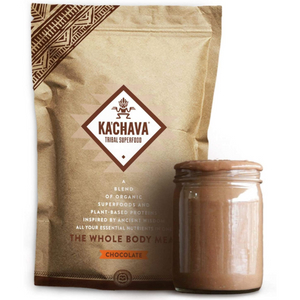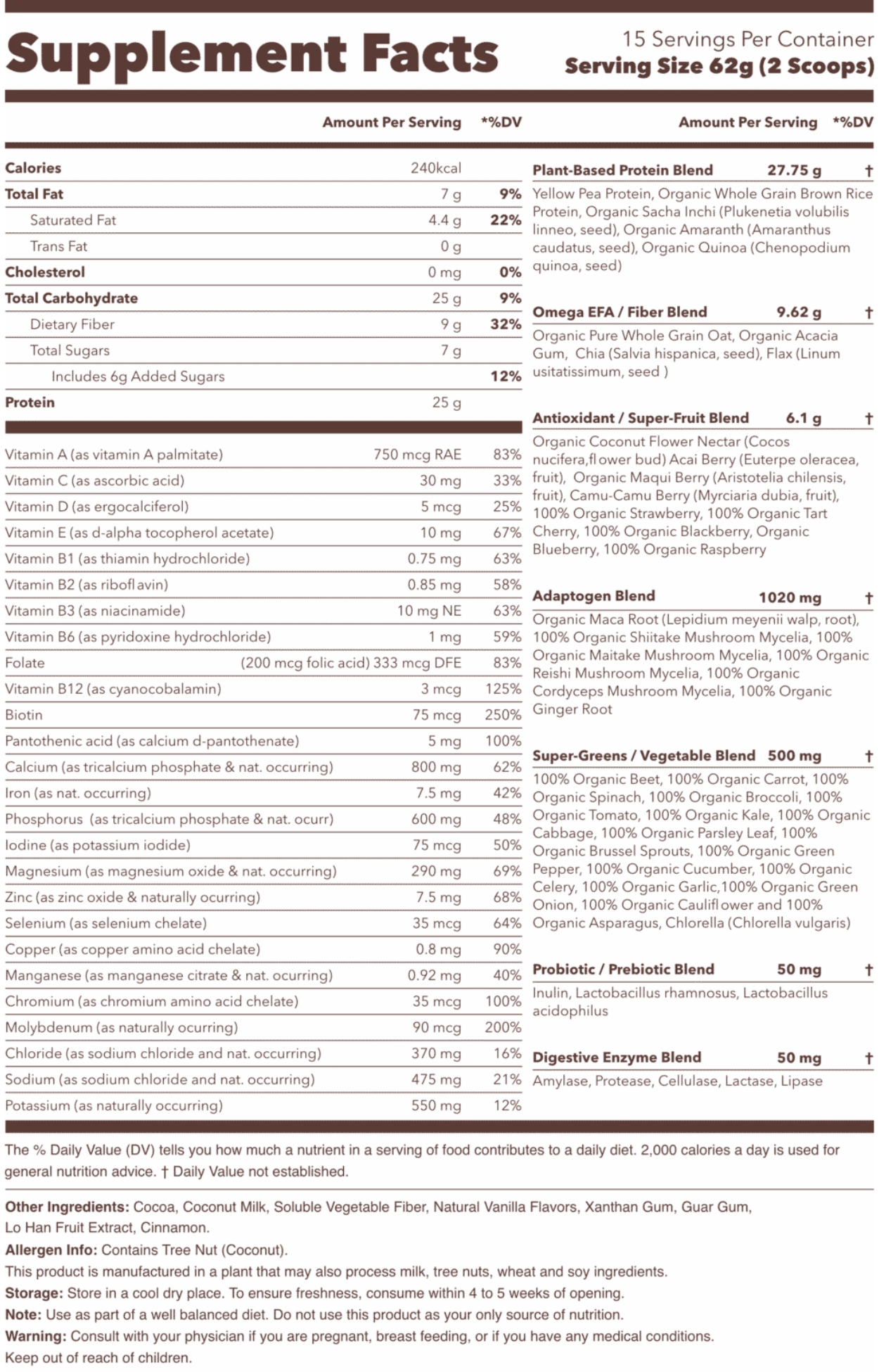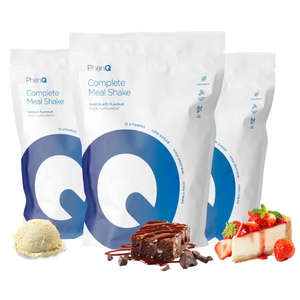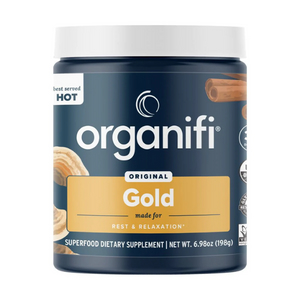Ka’Chava Reviews 2024: Is This Meal Replacement Shake Worth It?
All articles are produced independently. When you click our links for purchasing products, we earn an affiliate commission. Learn more about how we earn revenue by reading our advertise disclaimer.

9.1
Quality
8.0
Support Research
9.0
Reputation
8.0
Price
Features
- Suitable for vegans.
- Free from dairy, soy, and gluten.
- Free from preservatives and artificial colors, flavors, and sweeteners.
- 100 percent money-back guarantee.
- Mostly organic ingredients.
- Third-party tested for purity.
Brand Information
- Founded by Simon Malone in 2014.
- Based in Nevada, United States.
- Third-party tested for purity.
Medical Benefits
- Might support healthy weight loss.
- Might support healthy energy levels.
- A good source of protein.
- Might improve post-exercise recovery.
- Might improve digestion and gut health.
- Might support heart health.
About The Brand
Ka’chava is a vegan meal replacement shake created by founder Simon Malone in 2014.
What Is Ka’Chava?
Ka’chava is a protein powder and meal replacement supplement with added vitamins and minerals, digestive enzymes, and soluble vegetable fiber.
Ka’chava claims it can aid weight loss on a vegan diet and prides itself on supplying more than 85 superfoods. It even goes as far as to say its protein powder is “the world’s healthiest meal shake.”
Are they right? Read on for our Kachava review, including Kachava reviews from real customers, to find out.
Feature Product & Coupon

Ka’Chava
- Suitable for vegans.
- Free from dairy, soy, and gluten.
- Free from preservatives and artificial colors, flavors, and sweeteners.
- Doesn’t report levels of individual amino acids.
- Contains saturated fat.
- Each serving contains five grams of added sugars.
Does Ka’Chava Really Work?
To spend $3.99 per meal isn’t cheap, but that’s how much Ka’chava costs. So, the biggest question is: does Ka’chava really work?
Well, as a meal replacement, we think Ka’chava has done well to include all the important essential nutrients, vitamins, and minerals, even including enzymes and probiotics to improve digestion and nutrient absorption.
But, most importantly, does Ka’chava work for weight loss?
Does Kachava Help You Lose Weight?
Many Ka’chava customers want to lose weight, so most of the reviews on the Ka’chava website are Ka’chava weight loss reviews. Most customers agreed that Ka’chava was filling and helped them eat less than normal.
One serving of Ka’chava is only 240 calories, which is much less than an average meal. So, if it fills you up like a meal but is less than half the calories of a normal meal, it makes sense that Ka’chava can help you lose weight.
However, there aren’t many reviews claiming that Ka’chava leads to significant weight loss, but this might be because customers tend to review the product before giving it a chance to work.
Read on to discover how the ingredients in Ka’chava might help you lose weight.
Ka’Chava Ingredients

Ka’chava is a protein and meal replacement powder with a good balance of macronutrients to optimize for fullness and muscle-building, all the essential vitamins and minerals you’d expect, whole-food antioxidants, and even pre- and probiotics for gut health.
Plant-Based Protein Blend
Protein is an essential macronutrient crucial for repairing and building muscle as well as building hormones and enzymes. Protein is also the most filling macronutrient[1] and stimulates hormones[2] that make us feel more satisfied, which is why weight loss diets are usually high in protein.
Per serving, Ka’chava provides 25 grams of protein from its plant-based protein blend of ingredients, including yellow pea protein, organic whole grain brown rice protein, organic sacha inchi seed, organic amaranth seed, and organic quinoa seed.
This combination should ensure you’re getting all nine essential amino acids. However, Ka’chava does not tell us the levels of individual amino acids provided to confirm this.
Omega EFA / Fiber Blend
Omega-3 fats and fiber are essential nutrients crucial for good health. Omega-3 is essential for brain health[3] and heart health[4] and can reduce inflammation and oxidative stress. Dietary fiber is critical for gut health[5] because it feeds the gut bacteria and can also keep you satisfied for longer, aiding weight loss.
Ka’chava provides six grams of dietary fiber per serving. This mostly comes from their essential fatty acid, or EFA, and fiber blend, including organic pure whole-grain oat, organic acacia gum, chia seed, and flax seed.
However, they don’t disclose how much omega-3 is provided per serving.
Antioxidant / Super-Fruit Blend
Antioxidants are non-essential nutrients[6] found in plants, often giving plant-based foods their vibrant colors. They help neutralize free radicals that arise from oxidative stress in the body due to exposure to things such as mental stress, toxins, aging, ultraviolet light exposure, and cigarette smoke.
Ka’chava’s antioxidant blend includes organic coconut flower nectar, acai berry, organic maqui berry, camu-camu berry, organic strawberry, organic tart cherry, organic blackberry, organic blueberry, and organic raspberry.
However, while evidence suggests that consuming a diet high in antioxidant-rich foods promotes overall health,[7] there’s little evidence that supplementing antioxidants has the same health benefits. That’s why we like that Ka’chava only includes whole food ingredients.
Adaptogen Blend
Adaptogenic herbs[8] have a balancing effect on hormones and other chemical messengers in the body, helping you respond to and recover from stress, whether mental, physical, or environmental. Supposedly, they can help alleviate stress by working in two directions, depending on your needs. For example, adaptogens might regulate hormone levels by increasing or decreasing certain chemicals.
Ka’chava’s adaptogen herb blend includes organic maca root, organic shiitake mushroom mycelia, organic maitake mushroom mycelia, organic reishi mushroom mycelia, organic cordyceps mushroom mycelia, and organic ginger root.
Super-Greens / Vegetable Blend
Many of the essential vitamins and minerals in Ka’chava naturally occur from their whole food vegetable ingredients. For instance, dark leafy greens are a good source of iron, calcium, potassium, phosphorus, and carotenoids.
Ka’chava also includes a vegetable blend of organic beet, organic carrot, organic spinach, organic broccoli, organic tomato, organic kale, organic cabbage, organic parsley leaf, organic Brussels sprouts, organic green pepper, organic cucumber, organic celery, organic garlic, organic green onion, organic cauliflower, organic asparagus, and chlorella.
These veggies will also contribute to the dietary fiber content of Ka’chava.
Probiotic / Prebiotic Blend
Many human diseases are linked to an imbalance in the gut microbiome, and studies suggest supplementing probiotics can help[9] counteract some of this imbalance. Ka’chava’s probiotic and prebiotic blend includes inulin fiber and the probiotic species Lactobacillus Rhamnosus and Lactobacillus Acidophilus.
Digestive Enzyme Blend
Digestive enzymes are critical for you to break down the macronutrients[10] in your foods, including carbohydrates, proteins, fats, and lactose — a carbohydrate found in milk. Studies show that supplementing digestive enzymes can help improve gut symptoms in cases of digestive enzyme insufficiency,[11] such as lactose intolerance or general aging.[12]
To boost the digestion and absorption of the ingredients in Ka’chava, it also includes a digestive enzyme blend of amylase, protease, cellulase, lactase, and lipase. Although Ka’chava is dairy-free, it includes lactase, presumably to aid the digestion of any milk products one might consume with it.
Other Ingredients
Alongside the naturally-occurring vitamins and minerals, Ka’chava also includes a range of added essential nutrients, such as vitamin D, vitamin B12, and iodine. This ensures Ka’chava is a safe and effective meal replacement powder and won’t lead to nutrient deficiencies.
Other ingredients include coconut milk, natural flavors (including natural vanilla flavors), soluble vegetable fiber, xanthan gum, guar gum, and lo han fruit extract. The chocolate flavor includes cocoa and cinnamon, and the matcha flavor includes organic green tea and organic moringa. The coconut acai and chai flavors just contain different natural flavors.
Alternatives To Ka’Chava

PhenQ
- Formulated to increase fat burning.
- Might help suppress appetite.
- 60-day money-back guarantee.
- Includes caffeine, which might impact sleep.
- Includes proprietary ingredient blends.

LYFE Fuel
- High in protein.
- Lots of healthy ingredients.
- A good blend of essential vitamins and minerals.
- Includes sugar from organic coconut sugar.
- Includes proprietary ingredient blends.

Organifi
- All organic ingredients.
- Third-party tested for purity.
- 30-day money-back guarantee.
- Includes proprietary ingredient blends.
Health Benefits Of Ka’Chava
Here are some of the Ka’chava benefits you might experience.
Weight Loss
Ka’chava was formulated with weight loss in mind. With a high dose of plant-based protein and fiber plus essential fatty acids, the balance of macronutrients is optimized to promote satiety and healthy weight management.
Experts recommend consuming 0.8 grams of protein per kilogram of body weight per day. According to the United States Food and Drug Administration,[13] or FDA, this works out at around 50 grams of protein per day for a standard male on a 2,000-calorie diet.
Ka’chava provides 25 grams of protein per serving, ensuring you’ll probably hit your recommended daily protein intake. Recent studies suggest that high-protein diets are no better than normal-protein diets[14] when it comes to weight loss, so any more protein than this would be unnecessary.
Ka’chava also contains nutrients that help regulate your metabolism and aid weight loss, such as probiotics, vitamin D, and magnesium. For example, studies show that supplementing magnesium helps regulate blood sugar balance, which can curb hunger and reduce calorie intake.
Better Post-Exercise Recovery
Speaking of protein, Ka’chava includes the optimal amount to aid muscle recovery after exercise and muscle building[15] — when combined with resistance training.
One of the biggest mistakes most people make when exercising is waiting too long to consume protein. Experts say you should aim to consume a high-protein meal within two hours[16] of finishing the exercise to optimize recovery. Thereafter, protein should be consumed at regular three-hour intervals.
That’s not so easy when you have to prepare something to eat. But with Ka’chava, all you need to do is combine with water and consume. You can even make it in advance and take it to the gym with you to ensure you don’t miss that crucial first recovery window.
Improved Digestion & Gut Health
On a standard American diet, most people do not eat enough dietary fiber.[5] Fiber is crucial to feed your gut microbiome, so this is a big problem for gut health. A fiber deficiency might be the reason many of us suffer from gut issues[17] such as irritable bowel syndrome,[18] bloating, gassiness, and constipation.
According to the FDA, you should be eating 28 grams of dietary fiber per day.[13] This is for an adult on a 2,000-calorie diet, so will change depending on how many calories you eat in a day, your age, and your sex.
Ka’chava makes it easier to increase your fiber intake, but make sure it’s not your only source of fiber in your daily diet. Some nutrition experts say that it’s not the amount of fiber you eat in a day that’s important — what matters most is the diversity.[19]
For optimal gut health, expert Tim Spector recommends that, rather than counting the grams of fiber, you should aim to eat a minimum of 30 different plant-based foods per week.[20]
Increased Energy Levels
Many of us are deficient in essential vitamins and minerals crucial for energy production, especially vitamin D. And, if you’re vegan or vegetarian,[21] you’re at a higher risk of being deficient in vitamin B12, iron, and iodine — all critical for energy regulation.
Just consuming one serving of Ka’chava daily ensures you’ll get 100 percent of your recommended daily value of vitamin B12 and a significant proportion of the recommended daily values for vitamin D, iodine, folate, and iron.
Moreover, studies suggest that gut health is important for energy levels[22] and that adaptogenic herbs might benefit those with chronic fatigue syndrome.[23]
Other Health Benefits
According to the Ka’chava website, a few other health benefits of Ka’chava might include
- Better immune function.
- Improved cognition.
- Better mood regulation.
- Improved sleep.
- Improved heart health.
- Stronger bones and healthier joints.
Ka’chava Potential Side Effects
It’s unlikely you’ll experience harmful side effects from consuming Ka’chava, but here are some common adverse effects to watch out for.
- Digestive symptoms, such as bloating, gas, or diarrhea.
- Allergic reaction to coconut (tree nut).
If you’re pregnant, breastfeeding, or have any medical conditions, always consult with your healthcare provider before starting a new dietary supplement.
If you have a severe allergy to milk, wheat, or soy, you should be aware that Ka’chava is produced in a facility that also handles these ingredients.
Dosage
One serving, or meal, is two scoops of Ka’chava mixed with water, milk, or other liquid. Ka’chava recommends consuming one serving per day as a meal replacement.
Each bag of Ka’chava contains 15 servings. If you buy it as a one-off, it’ll cost you $69.95 or $4.66 per meal replacement. If you subscribe, you’ll save $10 per bag, putting each Ka’chava meal at $3.99.
If you don’t like the taste mixed with water, some customers recommend blending it with banana to make a smoothie. Another way to consume Ka’chava could be to combine it with nuts and dried fruits and eat it as raw protein balls.
Ka’Chava Reviews: What Do Real Users Say?
So, what do real users say about their experience with Ka’chava? Did it help them lose weight? Here are some real-world Kachava protein reviews, including some Kachava reviews from Amazon.
After taking it for 30 days I’m starting to feel better. I have more energy and it’s helping me with my appetite. I’m not eating as much because I feel fuller.
Jose D.
The first time that I tasted it I didn’t think that I liked it but I adjusted the dosage to make it a bit more watery, now I like it. I like that it doesn’t have any artificial sweeteners and is organic. It is important to me that I can understand all of the ingredients in the food that my family consumes. I have found that it makes a great lunch to take to work and keeps me full until dinner without any afternoon energy crash.
Kristine E.
Final Thought: Is Ka’Chava Worth Buying?
Ka’chava is one of the best vegan protein powders we’ve reviewed, with lots of positive reviews from real customers saying it helped them feel fuller and increased their energy levels.
And it’s not just a protein powder — it’s an all-around nutritious meal replacement, including all the essential vitamins and minerals you’d get from a healthy meal.
Yes, it sounds expensive at $3.99 per meal, but you won’t have to take any extra supplements, such as multivitamins, omega-3, digestive enzymes, and probiotics because they’re all included in Ka’chava.
Plus, if we trust the customer reviews, there’s a good chance Ka’chava can aid healthy weight management, too.
Frequently Asked Questions
Ka’chava includes a high dose of protein plus carbohydrates, healthy fats, and essential nutrients that are shown to increase satiety and aid blood sugar balance, which might help you lose weight.
Ka’chava shakes provides many of the essential nutrients you’d otherwise get from a healthy, balanced meal. However, you shouldn’t replace all your meals with Ka’chava.
No, Ka’chava does not contain stevia.
Ka’Chava provides several nutrients important for heart health, including dietary fiber, omega-3, magnesium, calcium, potassium, and folate.
We recommend drinking Ka’Chava as a meal replacement once per day. It’s important to use Ka’Chava, or any other meal replacement, alongside a healthy, balanced diet.
+ 23 sources
Health Canal avoids using tertiary references. We have strict sourcing guidelines and rely on peer-reviewed studies, academic researches from medical associations and institutions. To ensure the accuracy of articles in Health Canal, you can read more about the editorial process here
- Westerterp-Plantenga, M.S., Lemmens, S.G. and Westerterp, K.R. (2012). Dietary protein – its role in satiety, energetics, weight loss and health. British Journal of Nutrition, [online] 108(S2), pp.S105–S112. doi:10.1017/s0007114512002589.
- Tack, J., Verbeure, W., Mori, H., Schol, J., den Houte, K., Huang, I., Balsiger, L., Broeders, B., Colomier, E., Scarpellini, E. and Carbone, F. (2021). The gastrointestinal tract in hunger and satiety signalling. United European Gastroenterology Journal, [online] 9(6), pp.727–734. doi:10.1002/ueg2.12097.
- Shahidi, F. and Ambigaipalan, P. (2018). Omega-3 Polyunsaturated Fatty Acids and Their Health Benefits. Annual Review of Food Science and Technology, [online] 9(1), pp.345–381. doi:10.1146/annurev-food-111317-095850.
- Elagizi, A., Lavie, C.J., O’Keefe, E., Marshall, K., O’Keefe, J.H. and Milani, R.V. (2021). An Update on Omega-3 Polyunsaturated Fatty Acids and Cardiovascular Health. Nutrients, [online] 13(1), p.204. doi:10.3390/nu13010204.
- Barber, T.M., Kabisch, S., Pfeiffer, A.F.H. and Weickert, M.O. (2020). The Health Benefits of Dietary Fibre. Nutrients, [online] 12(10), p.3209. doi:10.3390/nu12103209.
- Berger, R.G., Lunkenbein, S., Ströhle, A. and Hahn, A. (2012). Antioxidants in Food: Mere Myth or Magic Medicine? Critical Reviews in Food Science and Nutrition, [online] 52(2), pp.162–171. doi:10.1080/10408398.2010.499481.
- Gantenbein, K.V. and Kanaka-Gantenbein, C. (2021). Mediterranean Diet as an Antioxidant: The Impact on Metabolic Health and Overall Wellbeing. Nutrients, [online] 13(6), p.1951. doi:10.3390/nu13061951.
- Panossian, A. (2017). Understanding adaptogenic activity: specificity of the pharmacological action of adaptogens and other phytochemicals. Annals of the New York Academy of Sciences, [online] 1401(1), pp.49–64. doi:10.1111/nyas.13399.
- Kim, S.-K., Guevarra, R.B., Kim, Y.-T., Kwon, J., Kim, H., Cho, J.H., Kim, H.B. and Lee, J.-H. (2019). Role of Probiotics in Human Gut Microbiome-Associated Diseases. Journal of Microbiology and Biotechnology, [online] 29(9), pp.1335–1340. doi:10.4014/jmb.1906.06064.
- Patricia, J.J. and Dhamoon, A.S. (2022). Physiology, Digestion. [online] Nih.gov. Available at: https://www.ncbi.nlm.nih.gov/books/NBK544242/
- Ianiro, G., Pecere, S., Giorgio, V., Gasbarrini, A. and Cammarota, G. (2016). Digestive Enzyme Supplementation in Gastrointestinal Diseases. Current Drug Metabolism, [online] 17(2), pp.187–193. doi:10.2174/138920021702160114150137.
- Rémond, D., Shahar, D.R., Gille, D., Pinto, P., Kachal, J., Peyron, M.-A., Dos Santos, C.N., Walther, B., Bordoni, A., Dupont, D., Tomás-Cobos, L. and Vergères, G. (2015). Understanding the gastrointestinal tract of the elderly to develop dietary solutions that prevent malnutrition. Oncotarget, [online] 6(16), pp.13858–13898. doi:10.18632/oncotarget.4030.
- Center (2022). Daily Value on the New Nutrition Facts Label. [online] U.S. Food and Drug Administration. Available at: https://www.fda.gov/food/new-nutrition-facts-label/daily-value-new-nutrition-and-supplement-facts-labels
- Lim, J.J., Liu, Y., Lu, L.W., Barnett, D., Sequeira, I.R. and Poppitt, S.D. (2022). Does a Higher Protein Diet Promote Satiety and Weight Loss Independent of Carbohydrate Content? An 8-Week Low-Energy Diet (LED) Intervention. Nutrients, [online] 14(3), p.538. doi:10.3390/nu14030538.
- Pasiakos, S.M., McLellan, T.M. and Lieberman, H.R. (2014). The Effects of Protein Supplements on Muscle Mass, Strength, and Aerobic and Anaerobic Power in Healthy Adults: A Systematic Review. Sports Medicine, [online] 45(1), pp.111–131. doi:10.1007/s40279-014-0242-2.
- Kerksick, C.M., Arent, S., Schoenfeld, B.J., Stout, J.R., Campbell, B., Wilborn, C.D., Taylor, L., Kalman, D., Smith-Ryan, A.E., Kreider, R.B., Willoughby, D., Arciero, P.J., VanDusseldorp, T.A., Ormsbee, M.J., Wildman, R., Greenwood, M., Ziegenfuss, T.N., Aragon, A.A. and Antonio, J. (2017). International society of sports nutrition position stand: nutrient timing. Journal of the International Society of Sports Nutrition, [online] 14(1). doi:10.1186/s12970-017-0189-4.
- Rao, S.S.C., Yu, S. and Fedewa, A. (2015). Systematic review: dietary fibre and FODMAP-restricted diet in the management of constipation and irritable bowel syndrome. Alimentary Pharmacology & Therapeutics, [online] 41(12), pp.1256–1270. doi:10.1111/apt.13167.
- Thomas, A., Thomas, A. and Butler-Sanchez, M. (2021). Dietary Modification for the Restoration of Gut Microbiome and Management of Symptoms in Irritable Bowel Syndrome. American Journal of Lifestyle Medicine, [online] 16(5), pp.608–621. doi:10.1177/15598276211012968.
- Asnicar, F., Berry, S.E., Valdes, A.M., Nguyen, L.H., Piccinno, G., Drew, D.A., Leeming, E., Gibson, R., Le Roy, C., Khatib, H.A., Francis, L., Mazidi, M., Mompeo, O., Valles-Colomer, M., Tett, A., Beghini, F., Dubois, L., Bazzani, D., Thomas, A.M. and Mirzayi, C. (2021). Microbiome connections with host metabolism and habitual diet from 1,098 deeply phenotyped individuals. Nature Medicine, [online] 27(2), pp.321–332. doi:10.1038/s41591-020-01183-8.
- Lee, K.A., Shaw, H.M., Bataille, V., Nathan, P. and Spector, T.D. (2020). Role of the gut microbiome for cancer patients receiving immunotherapy: Dietary and treatment implications. European Journal of Cancer, [online] 138, pp.149–155. doi:10.1016/j.ejca.2020.07.026.
- Neufingerl, N. and Eilander, A. (2021). Nutrient Intake and Status in Adults Consuming Plant-Based Diets Compared to Meat-Eaters: A Systematic Review. Nutrients, [online] 14(1), p.29. doi:10.3390/nu14010029.
- Romaní-Pérez, M., Bullich-Vilarrubias, C., López-Almela, I., Liébana-García, R., Olivares, M. and Sanz, Y. (2021). The Microbiota and the Gut–Brain Axis in Controlling Food Intake and Energy Homeostasis. International Journal of Molecular Sciences, [online] 22(11), p.5830. doi:10.3390/ijms22115830.
- Todorova, V., Ivanov, K., Delattre, C., Nalbantova, V., Karcheva-Bahchevanska, D. and Ivanova, S. (2021). Plant Adaptogens—History and Future Perspectives. Nutrients, [online] 13(8), p.2861. doi:10.3390/nu13082861.



